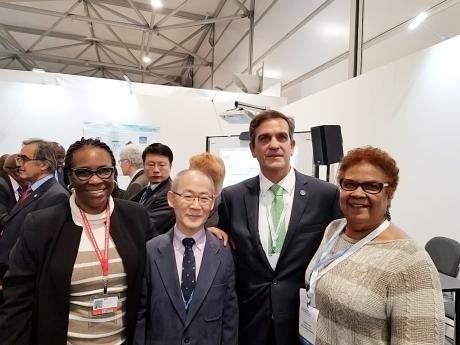Earth Today | Wanted: Targeted climate change sensitisation of private sector
AFTER TWO tension-filled weeks of climate negotiations in Poland, leading to a package of guidelines to inform the implementation of the Paris Agreement, it is now more important than ever to cement private-sector involvement in climate-change interventions.
So says Eleanor Jones, head of Environmental Solutions Limited, who was in Poland as a private-sector representative on the Jamaica delegation.
"We have private-sector entities in Jamaica doing a number of things, but they are not associating it with climate change. We need to highlight some of those successes (to help inspire others to action)," she said.
"This is true, especially in the area of renewables, which is a very important part of going towards a low-carbon economy, and integrating efficiency in energy into all different aspects of what we do," Jones added.
The need to push for a low-carbon economy is essential for the realisation of the ambition reflected in the Paris Agreement to hold "the increase in the global average temperature to well below 2 degrees Celsius above pre-industrial levels and pursuing efforts to limit the temperature increase to 1.5 degrees Celsius above pre-industrial levels, recognising that this would significantly reduce the risks and impacts of climate change".
Greenhouse gas emissions fuel global warming, which, in turn, drive climate change impacts, including sea-level rise and associated impacts, including for health and food security.
The work required to reach that goal and in particular, the 1.5 target, has been reinforced by the recently published the Intergovernmental Panel on Climate Change special report on global of warming of 1.5 degrees Celsius.
One of the authors of that report, Professor Michael Taylor, has himself noted the need for sensitisation among various stakeholders - particularly in relation to the findings of the report. This to drive home the necessity for comprehensive, consistent and urgent action.
READINESS
Meanwhile, Jones said technocrats involved in climate-change readiness planning and implementation must begin to more efficiently communicate with the private sector.
"For example, in Poland, they are a big coal-producing country, but they are trying to transform their economy. We want to see our own private sector do that," she said.
"There are a lot of companies, too, looking at increasing their efficiency, and not only in terms of energy, but also water. Instead of looking at these things as nice things to do, we need to integrate them into our operations. With sensitisation, we want to increase the desire of the private sector to do that," Jones added.
At the same time, she said there are a number of opportunities to make the required changes, about which the private sector needs to be informed.
"The Green Climate Fund (GCF) has a readiness programme which Jamaica has already got funding for and they will apply to the private sector nationally and regionally ... and finance is always an issue to introduce new technologies and so on," she said.
With climate-change impacts, including extreme weather events, holding dire consequences, as seen in the Caribbean in the last hurricane season, the time is now to motivate the private sector.
"A part of what the private sector will have to do is anticipate what some of these impacts will be. Companies will need to look at business continuity plans and how to reduce environmental risk. So we need to examine our options to see where our exposure lies and to try to reduce the risk," Jones said.

